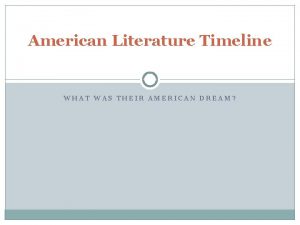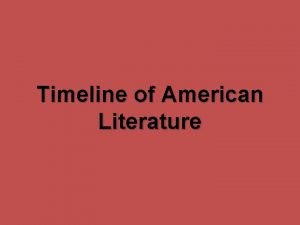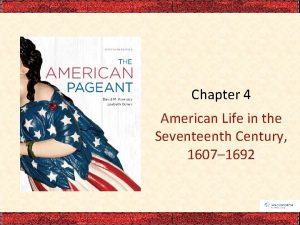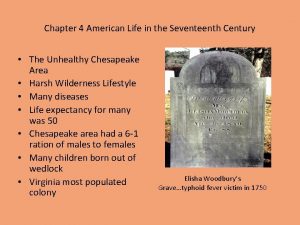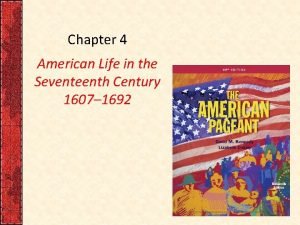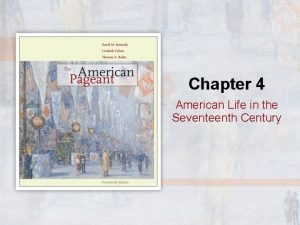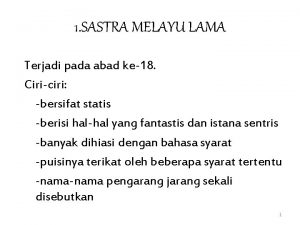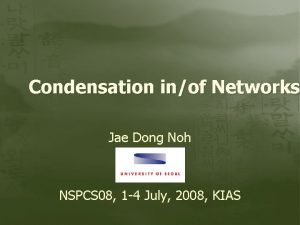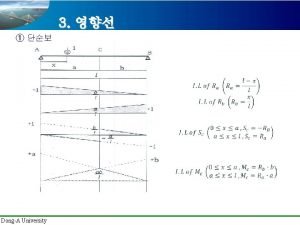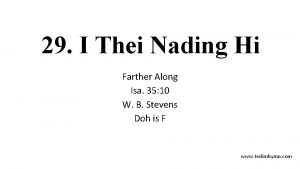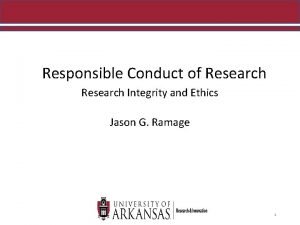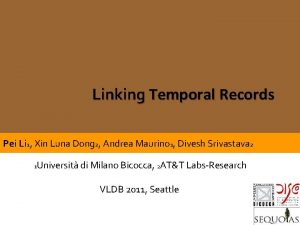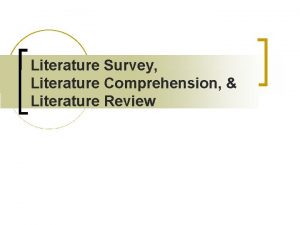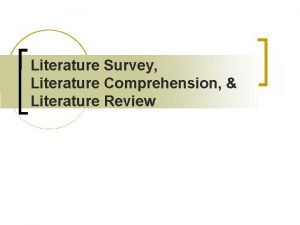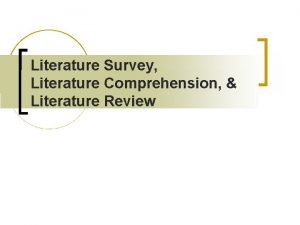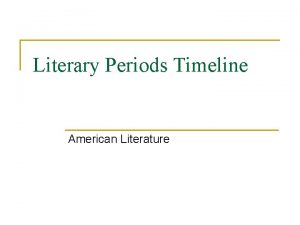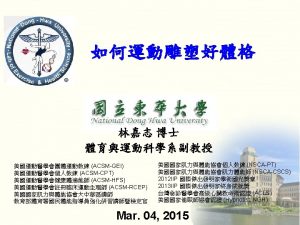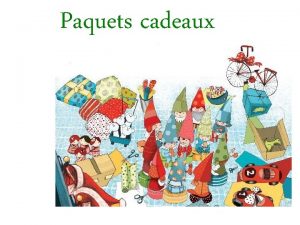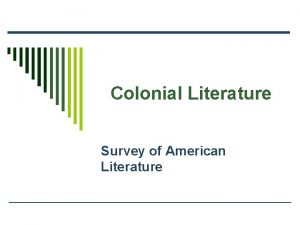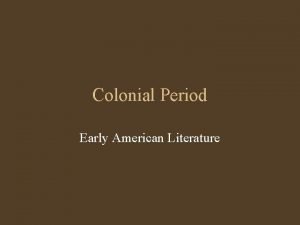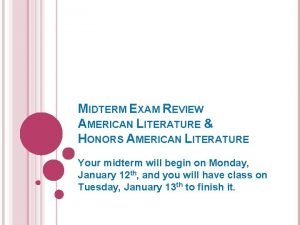th Timeline of 19 Century American Literature DONG






























- Slides: 30

th Timeline of 19 Century American Literature DONG A UNIVERSITY DEPARTMENT OF HUMANITIES PROFESSOR JOSEPH CARRIER

Overview PRECURSORS: � Puritan/Colonial “Age of Faith” (1650 -1750) � Enlightenment “Age of Reason” (1700 -1820) 19 TH CENTURY LITERARY MOVEMENTS 1. Romanticism (1800 -1860) 2. Transcendentalism (1840 -1860) 3. Realism and Naturalism (1855 -1900)

The Age of Faith (1650 -1750) OVERVIEW OF PURITAN/COLONIAL PERIOD: “The Age of Faith”. � Genre/Style : Sermons, religious tracts, diaries, personal narratives, religious poems. It was written in plain style. � Effect/Aspects : Instructive, reinforces authority of the Bible and the church. Very little imaginative literature was produced. � Historical Context : Puritan settlers fled England where they were being persecuted for their religious beliefs, and came to New England to have religious freedom. � Philosophical Emphasis: The Bible is the only source of truth. The physical world around us is not real. Only the spiritual world is real. Believed that mankind is essentially evil.

The Age of Faith (1650 -1750) � Anne Bradstreet (1612 -1672) The first published compilation of poems by an American was also the first American book to be published by a woman, Anne Bradstreet. Born and educated in England, Anne Bradstreet was the daughter of an earl's estate manager. She emigrated with her family when she was 18, and she lived in Boston.

The Age of Faith (1650 -1750) “TO MY DEAR AND LOVING HUSBAND” Anne Bradstreet. If ever two were one, then surely we. If ever man were loved by wife, then thee. If ever wife was happy in a man, Compare with me, ye women, if you can. I prize thy love more than whole mines of gold, Or all the riches that the East doth hold. My love is such that rivers cannot quench, Nor ought but love from thee give recompense. Thy love is such I can no way repay; The heavens reward thee manifold, I pray. Then while we live, in love let’s so persevere, That when we live no more, we may live ever. Psalm 23 (King James Bible, 1611) 1 The LORD is my shepherd; I shall not want. 2 He maketh me to lie down in green pastures: he leadeth me beside the still waters. 3 He restoreth my soul: he leadeth me in the paths of righteousness for his name's sake. 4 Yea, though I walk through the valley of the shadow of death, I will fear no evil: for thou art with me; thy rod and thy staff they comfort me. 5 Thou preparest a table before me in the presence of mine enemies: thou anointest my head with oil; my cup runneth over. 6 Surely goodness and mercy shall follow me all the days of my life: and I will dwell in the house of the LORD for ever.

The Age of Faith (1650 -1750) � Cotton Mather (1663 -1728) A historian and minister Mather wrote over 500 books and pamphlets. His writings covered a large variety of topics but his most important work was a history of New England, titled Magnalia Christi Americana (The History of Christ’s Work in America).

Age of Reason (1750 -1800) � Overview of the Enlightenment: the “Age of Reason. ” � Genre/Style : Political Pamphlets, Travel Writing, and highly ornate persuasive writing. � Effect/Aspects : Patriotism and pride grows, creates unity about issues, and creates American character. � Historical Context : The enlightenment was brought about because of the printing press. In America, enlightenment thinkers encouraged Revolutionary War support. � Philosophical Emphasis: It promoted science and intellectual effort and opposed superstition and blind adherence to religious teachings. Encouraged individual freedom and democracy. Believed that mankind is essentially good.

Age of Reason (1750 -1800) � Benjamin Franklin (1706 - 1790) Benjamin Franklin, “practical yet idealistic, hard-working and enormously successful, ” was a second-generation immigrant who lived in Boston Massachusetts. Writer, printer, publisher, scientist, philanthropist, and diplomat, Mr. Franklin was the most famous and respected private figure of his time.

Age of Reason (1750 -1800) “Money has never made man happy, nor will it, there is nothing in its nature to produce happiness. The more of it one has the more one wants. ” Benjamin Franklin

Age of Reason (1750 -1800) � Thomas Paine (1737 -1809) Thomas Paine published a political pamphlet titled Common Sense in 1776. It inspired many people and contained ideas that led to the Declaration of Independence and the Revolutionary War. He believed that all men are equal and that monarchy is a suppressive and evil institution. Advocated freedom and democracy.

Age of Reason (1750 -1800) “My country is the world, and my religion is to do good. ” “Society in every state is a blessing, but government, even in its best stage, is but a necessary evil; in its worst state an intolerable one. ” Thomas Paine

Comparing Ideas: Puritanism vs. Enlightenment Puritanism Enlightenment Original Sin: Men are evil, born “sinners” Noble Savage: Men are born pure Society is needed to control evil men Society is bad and corrupts pure mankind Nature/Wilderness Nature is meant to be used by men Nature is meant to be studied by men Science and Religion Mankind should not question God’s order Science is a noble and important pursuit All non-Christian art or literature is evil Emphasis on human intelligence Mankind Society/Government Art and Literature

Romanticism (1800 -1860) � Overview of Romanticism: � Genre/Style : Character Sketches, Slave Narratives, Poetry, and short stories. � Effect/Aspects : Integrity of nature and freedom of imagination. � Historical Context : Publishing expands and industrial revolution brings new ideas. Romanticism begins in England Germany. � Philosophical Emphasis: Romanticism is a reaction against the “reason” of the Enlightenment. They believe that truth is found in human emotion, especially through experiences in nature (Awe).

Romanticism (1800 -1860) � Henry Wadsworth Longfellow (1807 -1882) One of the most important Boston poets was Henry Wadsworth Longfellow, a professor of modern languages at Harvard, was the bestknown American poet of his day. He was responsible for the sentimental, historical and legendary sense of the past that joined American and European traditions.

Romanticism (1800 -1860) � Washington Irving (1783 - 1859) He was the youngest of 11 children, born to a wealthy New York mercantile family. Washington Irving became a cultural and diplomatic ambassador to Europe, like Benjamin Franklin and Nathaniel Hawthorne. His stories are funny caricatures of well-known New England stereotypes.

Romanticism (1800 -1860) � Herman Melville (1819 - 1891) Herman Melville was a descendant of an old, wealthy family that fell suddenly into poverty upon the death of the father. At 19 he went to sea. His interest in sailors' lives grew naturally out of his own experiences, and most of his early novels grew out of his voyages. In these we see the young Melville's wide, democratic experience and hatred of tyranny and injustice.

Romanticism (1800 -1860) � Edgar Allan Poe (1809 - 1849) Edgar Allan Poe was a southerner with a darkly metaphysical vision mixed with elements of realism, parody, and burlesque. He refined the short story genre and created detective fiction. Many of his stories led to the genres of science fiction, horror, and fantasy so popular today.

Transcendentalism (1840 -1860) � Overview of Transcendentalism: � Genre/Style : Poetry, Short Stories, and Novels. � Effect/Aspects : Idealists, individualism, and symbolism. � Historical Context : A reaction against the negative teachings at Harvard University and in the church. Highly influenced by Romanticism and Eastern Philosophy (including Buddhism and the Hindu traditions). � Philosophical Emphasis: A belief in the goodness of both man and nature. A belief that society and its institutions - particularly organized religion and political parties - ultimately corrupted the purity of the individual. Man is at his best when truly independent.

Transcendentalism (1840 -1860) � Ralph Waldo Emerson (1803 -1882) Father of the Transcendental Movement, Emerson was probably the 19 th Century’s most important author. His writings emphasize self-reliance, individuality, and the symbolism of nature influenced Thoreau, Fuller, Melville, Whitman, Dickenson and many others.

Transcendentalism (1840 -1860) “Do not go where the path may lead, go instead where there is no path and leave a trail. ” Ralph Waldo Emerson

Transcendentalism (1840 -1860) � Henry David Thoreau (1817 - 1862) Thoreau is most famous for his book Walden, where he describes living alone in a small house he built by a small lake in the woods near Concord. Thoreau deeply loved nature and was deeply skeptical about the effect of industrialization on human life. He also said that it was right for an individual to disobey the law if he believed that the law was wrong.

Transcendentalism (1840 -1860) “As a single footstep will not make a path on the earth, so a single thought will not make a pathway in the mind. To make a deep physical path, we walk again and again. To make a deep mental path, we must think over and over the kind of thoughts we wish to dominate our lives. ” Henry David Thoreau

Transcendentalism (1840 -1860) �Margaret Fuller (1810 - 1850) � Margaret Fuller was a friend of Emerson and Thoreau. She was an important voice in the protest against slavery and one of the earliest proponents of women’s rights. Her book Woman in the 19 th Century is still considered one of the most important works in the history of women’s suffrage.

Transcendentalism (1840 -1860) � Walt Whitman (1819 -1892) Walt Whitman was a parttime carpenter, whose brilliant, pioneering work expressed the country's democratic spirit. His Leaves of Grass (1855), which he rewrote and revised throughout his life, contains "Song of Myself, " the most amazingly original poem ever written by an American.

Realism (1855 -1900) � Overview of Realism � Genre/Style : Novels, Short Stories, Objective Narrator, and does not tell reader how to interpret the story. � Effect/Aspects : Social and Aesthetic realism. � Historical Context : Civil War brought demand for a more true type of literature. � Philosophical Emphasis: Seeks to tell a story that is as much like reality as possible. Focuses on the natural patterns of speech and close observation of individual behaviors. May have a hidden message or lesson, but it is up to the reader to decide what that lesson is and if they believe it.

Realism (1855 -1900) � Mark Twain (1835 -1910) Samuel Clemens, also known by his pen name of Mark Twain, grew up in the Mississippi River frontier town of Hannibal, Missouri. IT has been said that all of American literature comes from one great book: Twain's Adventures of Huckleberry Finn. Twain's style, based on strong, realistic, everyday American speech, gave American writers a new appreciation for their national voice. Twain was the first major author to come from the heart of the country.

Realism (1855 -1900) � Jack London (1876 -1916) Jack London was a poor, selftaught worker from California. He, also a naturalist, became instantly famous from his first collection of stories, The Son of the Wolf (1900), set mainly in the Klondike region of Alaska and the Canadian Yukon. In his stories men fight against nature and nature usually wins.

Realism (1855 -1900) � Ambrose Bierce (1842 - 1914? ) Bierce fought in the Civil War. His writings are unique for their detailed descriptions of the horror of battle. His writings inspired later war writers, including Hemingway. His writings often contain both humor and a strong ethical message. He went to Mexico in 1913 to fight in the revolution and disappeared without a trace.

Works Cited � "American Passages. " Learner. Org. 2005. 3 Apr. 2006 � � � <http: //www. learner. org/resources/series 164. html>. Beck, Mr. "American Literary Movements. " 2006. Perry Public Schools. 3 Apr. 2006 <http: //www. perry. k 12. mi. us/beckweb/litmove. htm>. Garbis, Michelle. "Literary Periods and Their Characteristics. " Mrs. Garbis English Page. 2006. 3 Apr. 2006 <http: //www. teachnlearn. org/LITERARY%20 PERIODS%20 AND%20 THEIR% 20 CHARACTERISTICS. htm>. "Literary Movements. " WSU. 3 Apr. 2006 <http: //www. wsu. edu/~campbelld/amlit/litfram. html>. The Norton Anthology of American Literature. New York: Norton, 2007. Vanspanckeren, Kathryn. "Outline of American Literature. " USinfo. Nov. 1998. US Department of State. 2 Apr. 2006 <http: //usinfo. state. gov/products/pubs/oaltoc. htm>.

Overview PRECURSORS: � Puritan/Colonial “Age of Faith” (1650 -1750) � Enlightenment “Age of Reason” (1700 -1820) 19 TH CENTURY LITERARY MOVEMENTS 1. Romanticism (1800 -1860) 2. Transcendentalism (1840 -1860) 3. Realism and Naturalism (1855 -1900)
 Ding dong ding dong christmas bells are ringing
Ding dong ding dong christmas bells are ringing American dream history timeline
American dream history timeline Puritan age timeline
Puritan age timeline Chapter 4 american life in the seventeenth century
Chapter 4 american life in the seventeenth century Chapter 4 american life in the seventeenth century
Chapter 4 american life in the seventeenth century Chapter 4 american life in the seventeenth century
Chapter 4 american life in the seventeenth century Chapter 4 american life in the seventeenth century
Chapter 4 american life in the seventeenth century Poetry in 18th century
Poetry in 18th century Pooh pooh hypothesis
Pooh pooh hypothesis Peter dong
Peter dong Dong nao jin
Dong nao jin Hệ thống thông tin trong logistics
Hệ thống thông tin trong logistics Dong quai nedir
Dong quai nedir Jae dong noh
Jae dong noh Sơ đồ mạch điện chiều dòng điện
Sơ đồ mạch điện chiều dòng điện Theater 111
Theater 111 Changyu dong
Changyu dong Overhanged
Overhanged Sakkik
Sakkik Dong liu ustc
Dong liu ustc Disdoard
Disdoard Zhen dong berkeley
Zhen dong berkeley Lan dong
Lan dong Halimbawa ng banyagang salita
Halimbawa ng banyagang salita Dong liu ustc
Dong liu ustc Yuxiao dong
Yuxiao dong Cây mọc lên từ hạt
Cây mọc lên từ hạt Luna
Luna Xiaolong dong
Xiaolong dong Dong vo
Dong vo They mean business
They mean business

